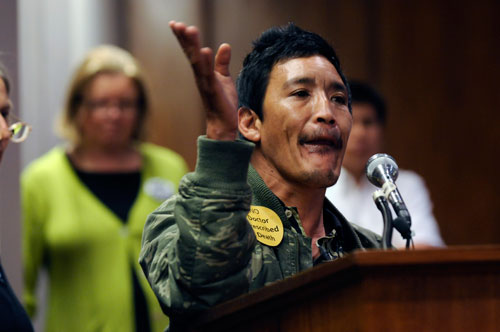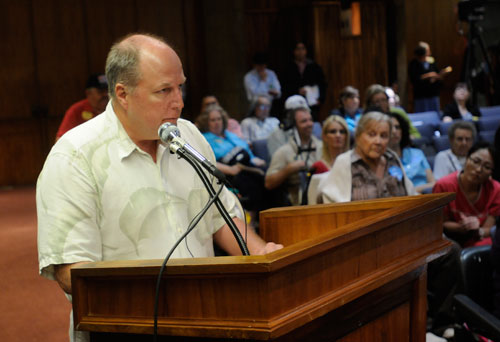Assisted suicide bill stalls

Michael Tada testified yesterday at the state Capitol, opposing a Senate bill to allow physician-assisted suicide.

Christopher Flanders, Hawaii Medical Association executive director, testified yesterday in the Capitol Auditorium against Senate Bill 803, which would allow a terminally ill competent adult to receive medication to end life.


After citing numerous examples of loved ones who outlived a doctor’s terminal diagnosis or of their own victory over suicidal depression, opponents of a proposal to legalize physician-assisted suicide in Hawaii applauded as a Senate committee defeated the measure last night.
The Senate Health Committee heard more than 4 1/2 hours of often-emotional public testimony before voting 4-0 to hold the bill in committee.
"After considering the large body of testimony presented to us, I have determined that community sentiment here today has been overwhelmingly opposed to moving this measure forward in its present form," said Sen. Josh Green, committee chairman. "There is truly compelling testimony on both sides of this matter — for and against — but from my perspective, for an issue of this magnitude, I believe we need to have more agreement as a community.
"So for now we need to find other ways to support those dealing with end-of-life decisions, with the greatest possible compassion and respect."
Senate Bill 803 would have allowed a terminally ill, competent adult to receive medication to end life. The bill specifically prohibits mercy killings, lethal injections and active euthanasia, and requires patients to receive informed consent.
Alternate doctors would be allowed to substitute for those who decline to participate, and the law also would have provided immunity from civil and criminal liability for acts taken in good faith.
Don't miss out on what's happening!
Stay in touch with breaking news, as it happens, conveniently in your email inbox. It's FREE!
Most of the testimony in opposition came from health care providers, disabled individuals, religious organizations and senior advocate groups, who likened the proposal to state-sponsored killing and arguing that many seniors would feel a "duty to die" to ease the burden on family members charged with their care.
"If we should kill anything, it shouldn’t be our kupuna, it should be this bill," said Allen Cardines Jr., executive director of the Hawaii Family Forum.
Martin Riggs, who uses a wheelchair, said he had no feeling in his hands or legs but showed up to testify against the proposal to prove a point to doctors and others who have told him he could not do things.
"You never know — if you died today, they might find a cure tomorrow," said Riggs, 59, of Pearl City.
The proposal was patterned after Oregon’s 1997 landmark Death with Dignity Act, which made it the first state to allow doctor-assisted suicide. But opponents also raised the case of Oregonian Barbara Wagner, a cancer patient whose health insurer refused to cover costly treatment drugs, but instead told her it would cover less expensive lethal drugs.
Supporters urged lawmakers to advance the proposal to bring it to the Senate floor for a vote.
Although proposals have been floating in the Legislature since 1999, it has not faced a full floor vote since 2002, when the Senate voted it down 14-11 on the final day of the regular session.
Among those in support of the proposal was Marsha Joyner, who said she values life but does not want to spend her final days in a hospital hooked up to various machines.
"Is it dignified to die in a hospital with strangers and all that equipment?" Joyner said. "Is that dignity? Is that quality when you could be at home with your loved ones?"
Green (D, Milolii-Waimea) was the last committee chairman to hear it in either chamber, doing so as the House health chairman in 2005 and 2007. The bill failed to make it out of his committee both years.
Green, a doctor, said that with so much turnover in the Legislature — and the Governor’s Office — he felt it was healthy to have fresh debate on such a difficult social issue.




